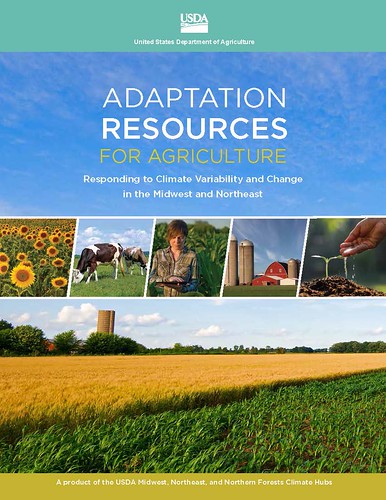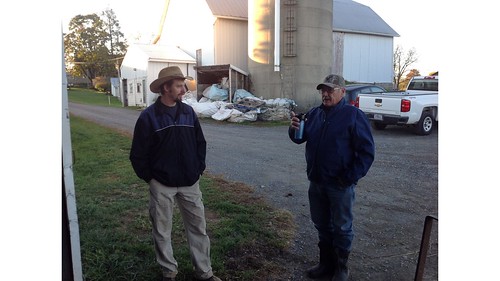
Changes in climate and more extreme weather are already increasing challenges for agriculture and natural resource managers nationally and globally. Many of these challenges are expected to continue into the future.
A new USDA report Adaptation Resources for Agriculture: Responding to Climate Variability and Change in the Midwest and Northeast provides educators and advisors information, perspective and resources to help farmers in the region prepare for, cope with and recover from the adverse impacts of a changing climate. Developed collaboratively by scientists, conservationists and educators, the report translates the best available climate science into usable resources for making climate-informed decisions.
Chapter One summarizes the effects of climate change on agriculture and natural resources in the Midwest and Northeast U.S. Chapter Two gives perspective on the concepts of climate adaptation in agriculture and the next three chapters provide new resources to put climate change information into action on the farm including adaptation strategies and approaches, an adaptation workbook, and examples for assessing and planning.
These new resources help extension educators, agricultural advisors and conservationists improve climate change education and adaptation assistance programs to help farmers sustain production, profitability and stewardship in the face of extreme weather and uncertain climate conditions.
Adaptation Strategies and Approaches provides a “menu” that brings together climate adaptation responses reported in peer-reviewed scientific literature and provides a clear rationale to connect planned actions to broad adaptation concepts. The Report also provides specific real-life adaptation tactics and actions—i.e., the how, where and when?—that can be applied on the ground. Adaptation tactics range from incremental adjustments of existing practices that help the production system address persistent climatic impacts to major alterations that transform the entire farm operation.
Flexible and adaptive management are key to reduce risk, increase resilience to potential disruptions, and even take advantage of opportunities presented by climate change. The Adaptation Workbook provides a structured process to consider potential climate change impacts, management challenges and opportunities, and climate adaptation responses.
Four examples of typical farming systems in the region: dryland farming in Nebraska, corn and soybean production in Iowa, small holder beef grazing and forestry in Missouri, and a confined dairy in Pennsylvania, give real-world perspectives on addressing challenges and opportunities of climate change.
Based upon the Forest Adaptation Resources developed by the U.S. Forest Service and Northern Institute of Applied Climate Science, Adaptation Resources for Agriculture was developed specifically to meet the unique needs of agricultural producers.
A team of authors from the Agriculture Research Service, the U.S. Forest Service and the Natural Resources Conservation Service worked together through USDA’s Climate Hubs for the Midwest, Northeast and Northern Forests to assemble the report. Educators, conservationists, and climate, agricultural and forestry scientists participated in workshops to test the concepts, translate them into easy to use worksheets, and develop the real-world examples.
You can download a pdf of the report at the National Climate Hubs website under the Adaptation Assistance menu.
For more on how USDA is helping farmers and land owners adapt to the effects of a changing climate see the related posts:
- New and Improved Tools Help Adapt Forests to Changing Conditions
- Adaptation Resources for Agriculture in the Midwest and Northeast




